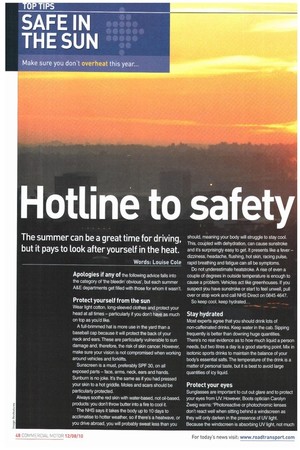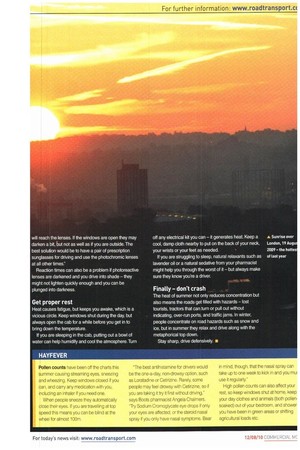Hotline to safet
Page 48

Page 49

If you've noticed an error in this article please click here to report it so we can fix it.
The summer can be a great time for driving, but it pays to look after yourself in the heat.
Words: Louise Cole Apologies if any of the following advice falls into the category of the bleedin obvious', but each summer A&E departments get filled with those for whom it wasn t.
Protect yourself from the sun
Wear light cotton, long-sleeved clothes and protect your head at all times — particularly if you don't have as much on top as you'd like A full-brimmed hat is more use in the yard than a baseball cap because it will protect the back of your neck and ears. These are particularly vulnerable to sun damage and, therefore, the risk of skin cancer. However, make sure your vision is not compromised when working around vehicles and forklifts.
Sunscreen is a must, preferably SPF 30. on all exposed parts — face, arms, neck. ears and hands Sunburn is no joke It's the same as if you had pressed your skin to a hot griddle Moles and scars should be particularly protected Always soothe red skin with water-based, not oil-based. products you don't throw butter into a fire to cool it The NHS says it takes the body up to 10 days to acclimatise to hotter weather, so if there's a heatwave, or you drive abroad. you will probably sweat less than you should, meaning your body will struggle to stay cool. This, coupled with dehydration. can cause sunstroke and it's surprisingly easy to get. It presents like a fever — dizziness, headache, flushing. hot skin, racing pulse, rapid breathing and fatigue can all be symptoms.
Do not underestimate heatstroke A rise of even a couple of degrees in outside temperature is enough to cause a problem Vehicles act like greenhouses. If you suspect you have sunstroke or start to feel unwell, pull over or stop work and call NHS Direct on 0845 4647.
So keep cool, keep hydrated..
Stay hydrated
Most experts agree that you should drink lots of non-caffeinated drinks Keep water in the cab Sipping frequently is better than downing huge quantities. There's no real evidence as to how much liquid a person needs. but two litres a day is a good starting point. Mix in isotonic sports drinks to maintain the balance of your body's essential salts.The temperature of the drink is a matter of personal taste, but it is best to avoid large quantities of icy liquid.
Protect your eyes
Sunglasses are important to cut out glare and to protect your eyes from UV However, Boots optician Carolyn Zweig warns Photoreactive or photochromic lenses don't react well when sitting behind a windscreen as they will only darken in the presence of UV light. Because the windscreen is absorbing UV light, not much will reach the lenses If the windows are open they may darken a bit, but not as well as if you are outside. The best solution would be to have a pair of prescription sunglasses for driving and use the photochromic lenses .t all other times.
Reaction times can also be a problem if photoreactive enses are darkened and you drive into shade — they ight not lighten quickly enough and you can be @ lunged into darkness.
et proper rest
eat causes fatigue, but keeps you awake, which is a icious circle Keep windows shut during the day. but Ilways open the cab for a while before you get in to ' ring down the temperature If you are sleeping in the cab, putting out a bowl of ater can help humidify and cool the atmosphere Turn off any electrical kit you can — it generates heat. Keep a cool, damp cloth nearby to put on the back of your neck, your wrists or your feet as needed.
If you are struggling to sleep. natural relaxants such as lavender oil or a natural sedative from your pharmacist might help you through the worst of it — but always make sure they know you're a driver.
Finally don't crash
The heat of summer not only reduces concentration but also means the roads get filled with hazards — lost tourists, tractors that can turn or pull out without indicating, over-run ports, and traffic jams In winter. people concentrate on road hazards such as snow and ice, but in summer they relax and drive along with the metaphorical top down.
Stay sharp. drive defensively.








































































































































